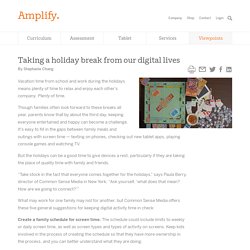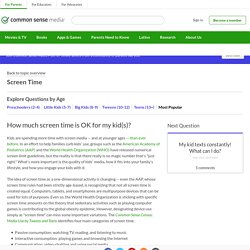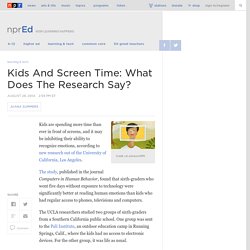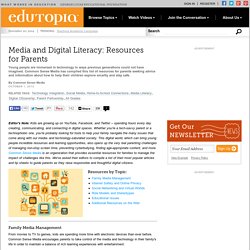

Taking a holiday break from our digital lives. Vacation time from school and work during the holidays means plenty of time to relax and enjoy each other’s company.

Plenty of time. Though families often look forward to these breaks all year, parents know that by about the third day, keeping everyone entertained and happy can become a challenge. It’s easy to fill in the gaps between family meals and outings with screen time — texting on phones, checking out new tablet apps, playing console games and watching TV. But the holidays can be a good time to give devices a rest, particularly if they are taking the place of quality time with family and friends. “Take stock in the fact that everyone comes together for the holidays,” says Paula Berry, director of Common Sense Media in New York.
What may work for one family may not for another, but Common Sense Media offers these five general suggestions for keeping digital activity time in check: Create a family schedule for screen time. Introduce a family movie or video game night. How much screen time is OK for my kid(s)? I agree with PiperBoj completely.

With me, I get to play 1 hour on weekdays, and 2 hours on weekends, after chores, homework, and other related stuff. I've learned to deal with the time limit, even though I still disagree with it. But my biggest problem with my parents, especially my dad, is the automatic screen time limit put on my PC, and also time periods when I can play, which my dad never remembers to fix. Of course I don't agree with all these things. Kids And Screen Time: What Does The Research Say? : NPR Ed. Kids are spending more time than ever in front of screens, and it may be inhibiting their ability to recognize emotions, according to new research out of the University of California, Los Angeles.

The study, published in the journal Computers in Human Behavior, found that sixth-graders who went five days without exposure to technology were significantly better at reading human emotions than kids who had regular access to phones, televisions and computers. The UCLA researchers studied two groups of sixth-graders from a Southern California public school. One group was sent to the Pali Institute, an outdoor education camp in Running Springs, Calif., where the kids had no access to electronic devices. For the other group, it was life as usual. At the beginning and end of the five-day study period, both groups of kids were shown images of nearly 50 faces and asked to identify the feelings being modeled. A Wake-Up Call For Educators There's a big takeaway for schools, Greenfield says. Www.k12.wa.us/Communications/PressReleases2014/SocialNetworking.pdf. EdTechTeacher iPad Summit Boston and San Diego.
3 Simple Rules for a Healthy Media Diet. Media and Digital Literacy: Resources for Parents. Editor's Note: Kids are growing up on YouTube, Facebook, and Twitter -- spending hours every day creating, communicating, and connecting in digital spaces.

Whether you’re a tech-savvy parent or a technophobic one, you’re probably looking for tools to help your family navigate the many issues that come along with our media- and technology-saturated society. This digital world, which can bring young people incredible resources and learning opportunities, also opens up the very real parenting challenges of managing non-stop screen time, preventing cyberbullying, finding age-appropriate content, and more.
Common Sense Media is an organization that provides essential resources for families to manage the impact of challenges like this. We've asked their editors to compile a list of their most popular articles and tip sheets to guide parents as they raise responsible and thoughtful digital citizens. Resources by Topic: Family Media Management Tip: Use media together. Back to Top. Digital Workshops - Online Resources For Parents And Educators. Learn how to be a better parent, teacher or caregiver to the “digital natives” in your life and gain the knowledge and skills for understanding, analyzing and participating in our technology-infused world.

WATCH the featured videos from Digital Nation.PARTICIPATE in online quizzes and polls to reflect on your digital life.RATE your agreement or disagreement with controversial issues in “Where Do You Stand?” READ more about “digital natives” from our parenting and educational experts.COMMENT on the ideas explored in this program. Acknowledgements Simone Nathan-Bloom and Professor Renee Hobbs conceptualized the design of this curriculum. Renee Hobbs developed the program materials with support from her team at the Media Education Lab at Temple University's School of Communications and Theater in Philadelphia, Pa. Digital Nation - Life On The Virtual Frontier. Digital literacy resources for parents, teachers and students. Preventing The Misuse Of Education Technology: A Guide For Parents & Teachers.